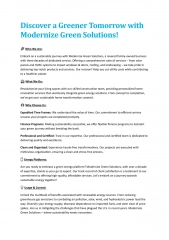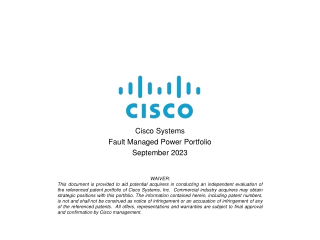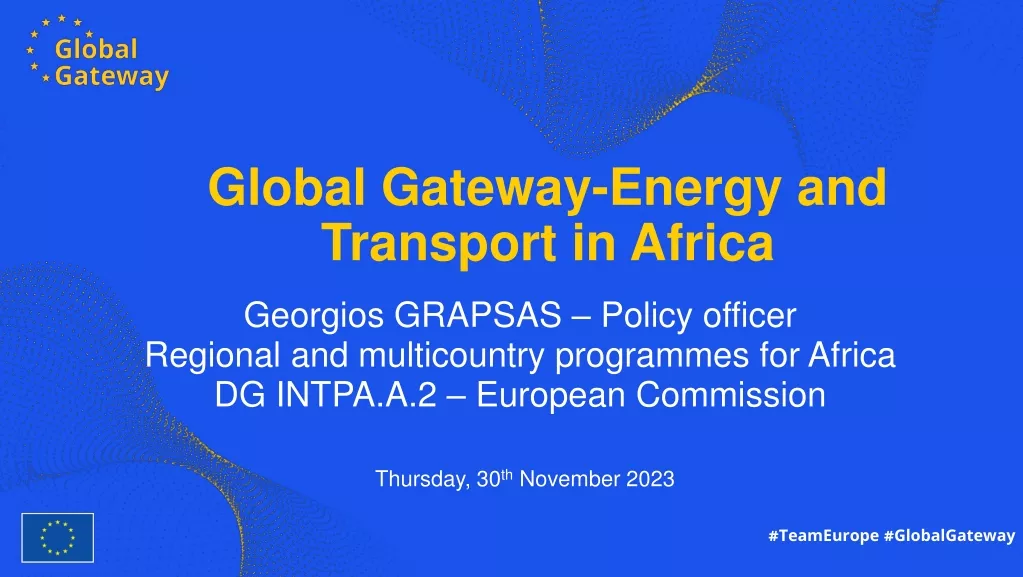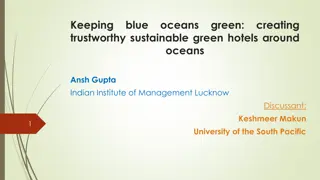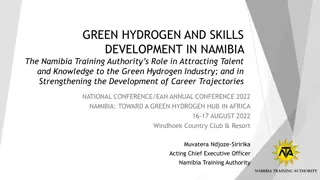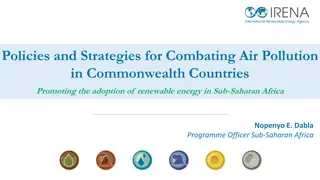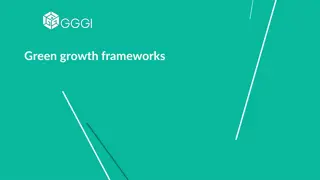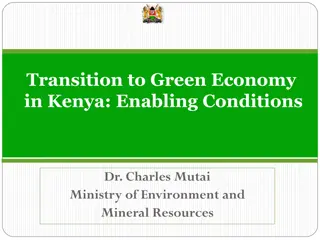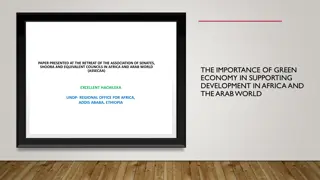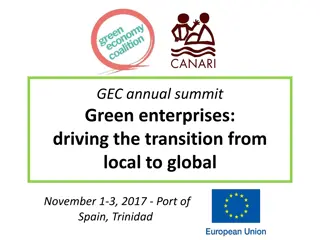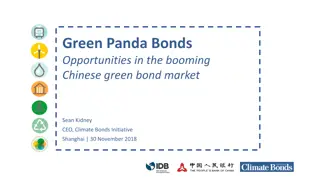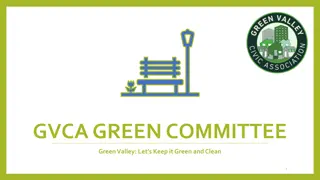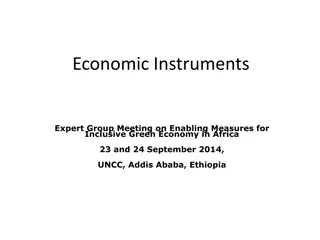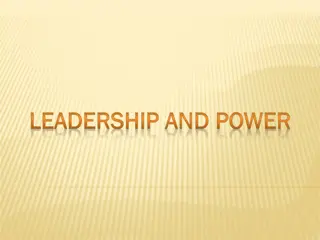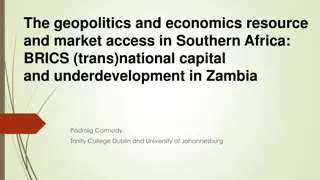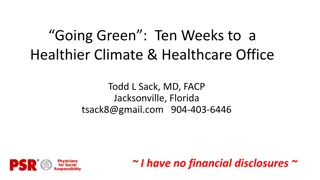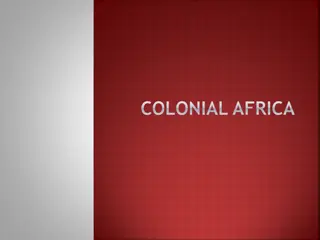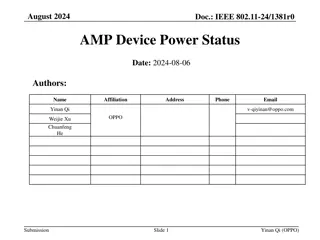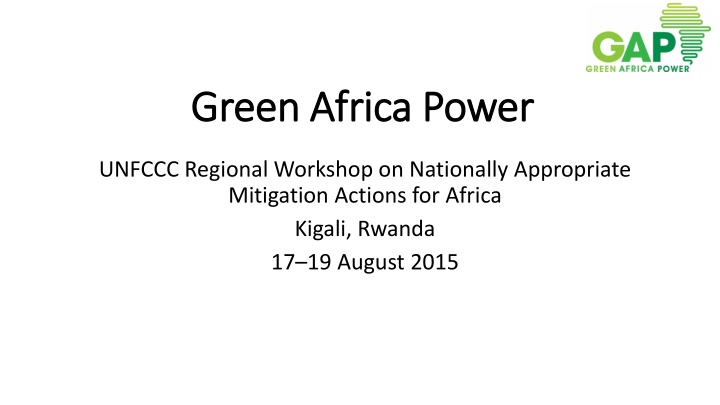
Green Africa Power
This content delves into the various financing options available for renewable energy projects in Africa. It covers debt financing by development finance institutions and banks, mezzanine financing, equity investments by developers, and showcases a case study of Linde Solar PV Farm in South Africa. Additionally, it highlights technical assistance, grants, loans, risk management, and equity capital options, along with organizations providing support in the sector. The content also discusses the establishment and funding of the GAP initiative under PIDG, its management structure, and investment managers involved in promoting renewable energy projects in Africa.
Download Presentation

Please find below an Image/Link to download the presentation.
The content on the website is provided AS IS for your information and personal use only. It may not be sold, licensed, or shared on other websites without obtaining consent from the author. If you encounter any issues during the download, it is possible that the publisher has removed the file from their server.
You are allowed to download the files provided on this website for personal or commercial use, subject to the condition that they are used lawfully. All files are the property of their respective owners.
The content on the website is provided AS IS for your information and personal use only. It may not be sold, licensed, or shared on other websites without obtaining consent from the author.
E N D
Presentation Transcript
Green Africa Power Green Africa Power UNFCCC Regional Workshop on Nationally Appropriate Mitigation Actions for Africa Kigali, Rwanda 17 19 August 2015
Renewable Energy Financing in Africa Renewable Energy Project Finance Model Debt -by DFI(IFC/PROPARCO/DEG/FMO/OPIC, etc) = (50% - 85%) Debt -by Banks(Standard Bank/RMB/Barclays etc) = (50% - 85%) Mezzanine financing(GAP/FMO/DEG) = (5% - 15%) Equity(Developers such as Scatec solar/BioTherm etc) = (15% - 50%)
Renewable Energy Financing in Africa Case Study in SA: Linde Solar PV Farm - 36.8MW Scatec USD135m Developer Financing Volume Standard Bank Group Norfund / Scatec Solar AS / Standard Bank Group Ltd. / Old Mutual Life Assurance Company Ltd. / Simacel Debt Providers Equity Investors Trinity International LLP / Norton Rose Fulbright / DLA Piper LLP / White & Case LLP SMA Solar Technology AG Legal Advisors Project Equipment/ Services Providers Source: Clean Energy Platform
Renewable Energy Financing Options Technical Assistance /Grant X X Long term loan X X X Short term loan Risk Management /Guarantees X X Equity Capital X X Mezzanine X X Organization DEG FMO Entrepreneurial Bank (IDF and AEF) KfW & Partners (SA & Tunisia only) Global Energy Efficiency and Renewable Energy Fund (GEEREF) International Climate Fund (UK) Global Climate Partnership Fund (SA & Tunisia) IRENA / Abu Dhabi Fund for Development (ADFD) African Carbon Asset Development Facility (ACAD) Climate and Development Knowledge Network Climate Finance Innovation Facility (CFIF) Climate Technology Initiative (CTI) Private Financing Advisory Network (PFAN) Norwegian Investment Fund for Developing Countries (Norfund) Interact Climate Change Facility (ICCF) Energy and Environment Partnership (EEP) EIB Climate Change Technical Assistance Facility IFC Partial Credit Guarantees IDB's Infrastructure Fund (InfraFund) IFC Risk Sharing Facility GAP X X X X X X X X X X X X X X X X X X X X X X X X X X X X X X
Current Status GAP formed April 2013. Part of the Private Infrastructure Development Group (PIDG) Funded by UK Government 95m. Funding agreement signed October 2014 & Norwegian government 26m (NOK 300m) signed December 2014 Management Board appointed. London based EISER Infrastructure LLP appointed Investment Manager July 2014 supported by Camco Clean Energy plc who have operations in London and several African locations. EISER & Camco are meeting developers to set up a pipeline of projects that need some GAP support to become viable.
Private Infrastructure Development Group DevCo managed by WB/IFC advising governments on structuring transactions to facilitate private sector participation in Infra.. Guarantco Provides guarantees to lenders to support local currency finance for projects ICF-DP Direct financing for projects in emerging economies Infraco Africa Early stage infrastructure project development fund Infraco Asia Technical Assistance Facility Assist other companies in capacity building The Emerging Africa Infrastructure Fund PPP offering long term debt and Mezz debt for infrastructure GAP
GAPs Mission Access to Reliable Electric Power is seen by many as an essential cornerstone of economic and social development including the enhancement of status of women and girls. Sustainable growth through the use of renewable technology brings an added benefit by reducing the effects of climate change. GAP will work with private sector developers to help them to bring forward new projects in this field. GAP will work with host governments to identify and overcome road blocks that are preventing the start up of new renewable power generation projects. GAP will encourage acceleration of new project ideas by measuring success and publicising the results of its activities to as wide an audience as possible.
GAPs Investment Policy Total Funding available currently 121m - to cover investment and operating costs. UK Department For International Development (DFID) 70m UK Department for Energy & Climate Change (DECC) 25m Norwegian Ministry of Foreign Affairs (MFA) 26m (NOK 300m) Targeting Private Sector Renewable Energy On Grid Power Generation, Investment in at least three DAC 1,2 and 3 countries in Sub Sahara Africa ( minimum 75% DAC1 & 2). At least three types of renewable technologies (wind, solar, hydro, geo-thermal, biomass, waste to energy) Investment via Mezzanine (Quasi Equity) Loans or Contingent Lines of Credit. Maximum Investment by GAP 20% of Capital Costs. Private Sector must invest at least twice the GAP Investment over the portfolio. GAP loans will be long term (typically 10+ years up to 20 years if supported by an appropriate PPA) and with commercial interest rates usually in the range of 10-12% pa. Investment Commitment Period 2015-2017 - First Investment targeted Q3 2015.
How GAP works GAP will consider approaches from developers who have projects that fit the GAP mandate. Developers can contact GAP via the website :- www.greeenafricapower.com Projects will be reviewed initially by the Investment Manager s Team. Final approval rests with the GAP Management Board. All investments held in the name of GAP.
Funding for Future Development GAP hopes to have committed the full value of its current funding by end 2017 with all funds invested by 2018. Limitations on the number of projects that can be financed would be a maximum of 5 per year. GAP will receive income from its loan portfolio but this will only cover at most one addition project per year from 2018 onwards. GAP can recycle proceeds from loan repayments or refinancing of projects but this unlikely to occur significantly before 2020.
GAP Management Board Jim Cohen Chairman (based UK) James Neal (based UK) Peter Bird (based Singapore) Godfrey Mwindaare (based Ghana) Supported by Peter Hutchinson Executive Director Based in London (Contact peter.hutchinson@greenafricapower.com)
EISER Infrastructure LLP London based fund management group specialising in Infrastructure Investment Opened office in Jo burg late 2014 ( 2 staff full time on GAP mandate) Participation in circa 3bn of Infrastructure Investment Contact Vivian Nicoli (Vivian.nicoli@eiserinfrastructure.com)
Camco Clean Energy plc London AIM listed company operating in the renewable energy sector Offices in London, US, RSA (co-located with EISER), Kenya, Tanzania & Togo. Also opening an office in Ghana. Project developer & participation in innovative battery storage technology Africa Based Advisory (Climate Change, Environment, Carbon Markets, RE Policy, Land Use & Forestry) Contact Eugene Obiero (Eugene.obiero@camcocleanerergy.com )

